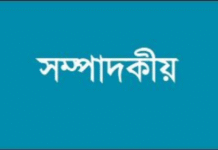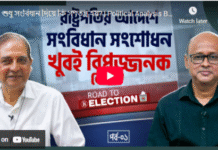Western countries will gradually accept the elections, but with public pronouncement for a desire for a more inclusive election soon
Prime Minister Sheikh Hasina’s grand plan for a second term started with the constitutional amendment on the caretaker government. Ironically however, the approval rating for her government, which was still high before the amendment, started to slide dramatically after this event. She realised this only after the rout of Awami League-sponsored mayoral candidates for five cities.
She put up a brave face digesting this defeat in public. In private, however, she saw the signs of impending defeat for her party in the upcoming general elections. There were two ways to prevent this defeat, she calculated. One was to wreck the main opposition BNP, headed by her arch rival Begum Khaleda Zia, by whatever means she could.
The other was to have an election without the main opposition. In devising strategies to achieve these goals, she had ample supply of political advice from her trusted ally across the border.
There were many ways to wreck the main opposition, overt and covert. The overt ways included painting the opposition as supporters of war criminals, which the opposition unwittingly gave credence to by their continued affiliation with Jamaat-e-Islami. The party was constantly cited as a collection of anti-liberation and hence anti-Bangladesh forces, labels that the party also could not remove successfully because of their political alliance in the previous government with Jamaat.
The ruling party successfully recruited and outsourced this vilification campaign to a newly sprung semi-political body of student and cultural activists who had mobilised to campaign for war crimes punishments.
The other overt way was to apply minimal force to stop the party from carrying out strikes and blockades. The intent was to establish BNP as a proselytiser of violence, and direct toward the party domestic and international displeasure and disapproval of the political violence that was taking place during strikes and blockades.
Nobody knows who the perpetrators of arson, murders, and absolute mayhem during the hartals and blockades actually were, since it is believed by some people that these largely criminal acts were performed by hired hands. No one can explain how, in large cities, buses could be set on fire by small groups of people, while law enforcing agencies watched.
No one can explain how small bands of youth could uproot railway slippers in broad daylight in places humming with people, without any opposition from anyone. No one can also explain why trains were not stopped before they started on their journeys over those damaged tracks.
Perhaps these are actual accidents, but it is also possible that these were deliberately planned accidents that could be assigned to the opposition and have it painted as the devil.
The covert way to wreck the opposition was to break its leadership, either by coercion or by persuasion. Coercion is an easy option, which the government could do by arrest, and arraignment on cooked-up charges. Persuasion was more difficult, since money cannot always buy all.
The government tried both, and it can be reasonably hypothesised that persuasion probably played a greater role. Given the past history of some of our political leaders, it is believed that some of those incarcerated in the last two months could have willingly decided to remain inside, rather than outside, because of policy differences with the chairperson of the party and her more powerful son.
This hypothesis will pan out more in the coming months if and when another midterm election is held. However, so far, physical absence of some of the top leaders from the opposition’s campaign to stop the general elections on January 5 helped the ruling party greatly. Has anyone wondered why the opposition rallies did not demand the release of these leaders from jail?
Despite an international outcry for an all-inclusive election and entreaties to Sheikh Hasina not to hold the elections with a made up opposition, she went ahead because she had the support of the most important foreign power that had also provided the needed moral boost for the elections. The opposition rally and threat to disrupt the elections did not hold out, proving that Sheikh Hasina’s strategy was right.
She not only received endorsements of the election results from India, but also a backslapping from another important ally, Russia. China has recently given its endorsement. The Western countries, including the USA, will also gradually accept the elections grudgingly, but with public pronouncement for a desire for the government to hold a more inclusive election soon.
But no one except Hasina knows when and if at all these elections will happen. For now, Hasina will hold out the carrot of another election to the opposition, but she will hold it only till the opposition has split into ways that the former Yugoslovia went.
Source: Dhaka Tribune










